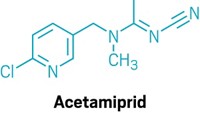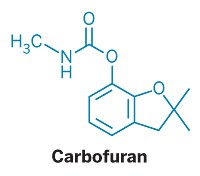Advertisement
Grab your lab coat. Let's get started
Welcome!
Welcome!
Create an account below to get 6 C&EN articles per month, receive newsletters and more - all free.
It seems this is your first time logging in online. Please enter the following information to continue.
As an ACS member you automatically get access to this site. All we need is few more details to create your reading experience.
Not you? Sign in with a different account.
Not you? Sign in with a different account.
ERROR 1
ERROR 1
ERROR 2
ERROR 2
ERROR 2
ERROR 2
ERROR 2
Password and Confirm password must match.
If you have an ACS member number, please enter it here so we can link this account to your membership. (optional)
ERROR 2
ACS values your privacy. By submitting your information, you are gaining access to C&EN and subscribing to our weekly newsletter. We use the information you provide to make your reading experience better, and we will never sell your data to third party members.
Environment
Carbofuran Faces Ban
EPA decision could speed up removal of food pesticide from the U.S. market
by Britt E. Erickson
July 29, 2008

In a move that caught industry and environmental groups by surprise, the Environmental Protection Agency proposed on July 24 to ban residues of the neurotoxic pesticide carbofuran on all foods sold in the U.S., regardless of whether the food is imported or domestically grown. The proposal is contrary to EPA’s prior position, announced earlier this year, that would have allowed residues of the pesticide on imported foods and, if implemented, will expedite the elimination of carbofuran from the U.S. market.
EPA will now accept comments on its proposal for 60 days, beginning on July 30, before putting in place a final rule. FMC Corp., the sole manufacturer of carbofuran in the U.S., has indicated that it plans to respond. “This does give us an opportunity to prove this product is safe from a dietary risk standpoint,” said John Cummings, North America regulatory manager of FMC Agricultural Products Group. “FMC believes strongly that carbofuran residue on food does not pose a threat to human health.”
In the U.S., carbofuran is used primarily as a “last-ditch rescue attempt” on crops that have been attacked by pests, says Jennifer Sass, a senior scientist with the Natural Resources Defense Council, an environmental group that has petitioned EPA to ban carbofuran residues on food. “By the time you are trying a last-ditch attempt to save your crop from a pest, you are really only saving a small percentage of your crop anyway,” she adds.
In January, EPA signaled that it would not allow future uses of carbofuran because of significant health risks to humans and wildlife and because of negligible economic benefits (C&EN, Feb. 18, page 26). As a result, FMC sued EPA claiming that the agency had not proven that the chemical is unsafe. Specifically, FMC is asking EPA to reconsider its position on carbofuran for five major crops—corn, potatoes, sunflowers, melons, and cotton—for which the company says no viable alternative pesticides exist. The lawsuit is ongoing.
Although FMC claims that only 75,000 gallons of carbofuran would be applied annually in the U.S., the chemical is widely used in developing countries on a range of crops including bananas, coffee, sugar cane, and rice.




Join the conversation
Contact the reporter
Submit a Letter to the Editor for publication
Engage with us on Twitter